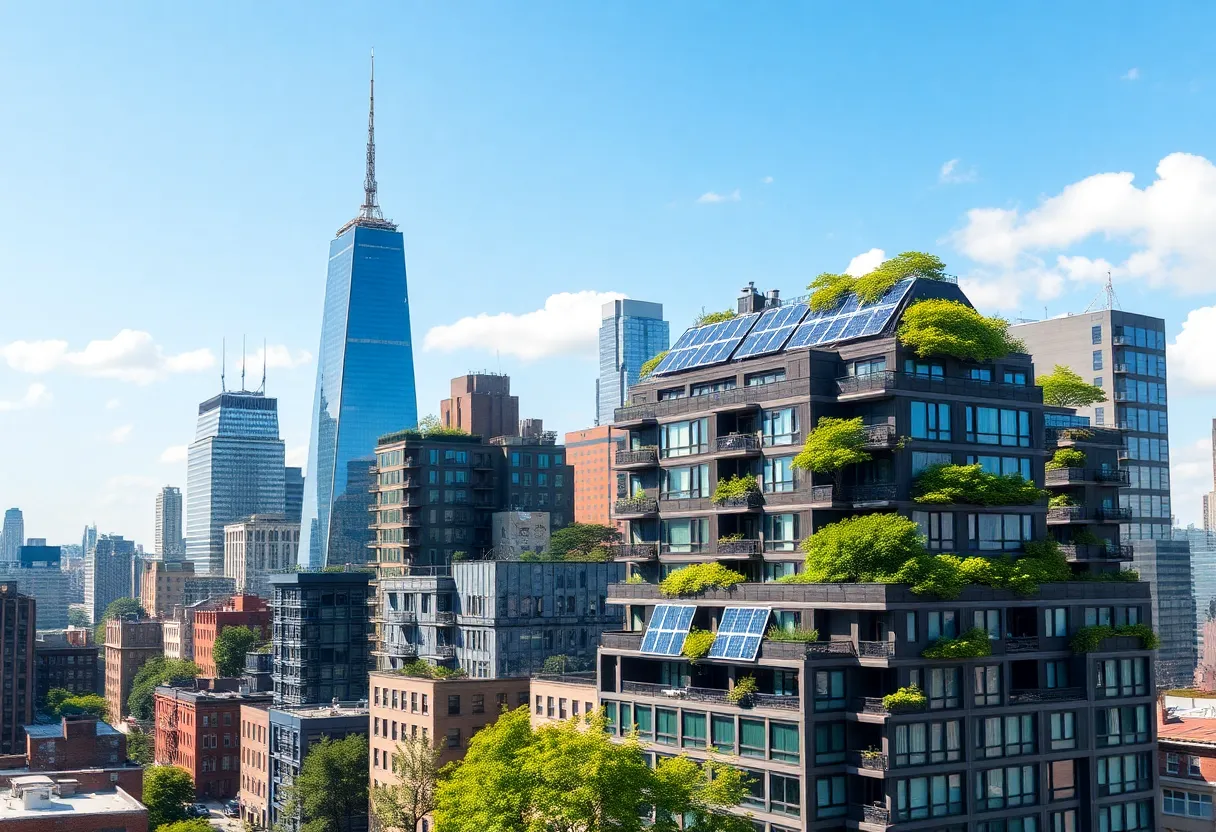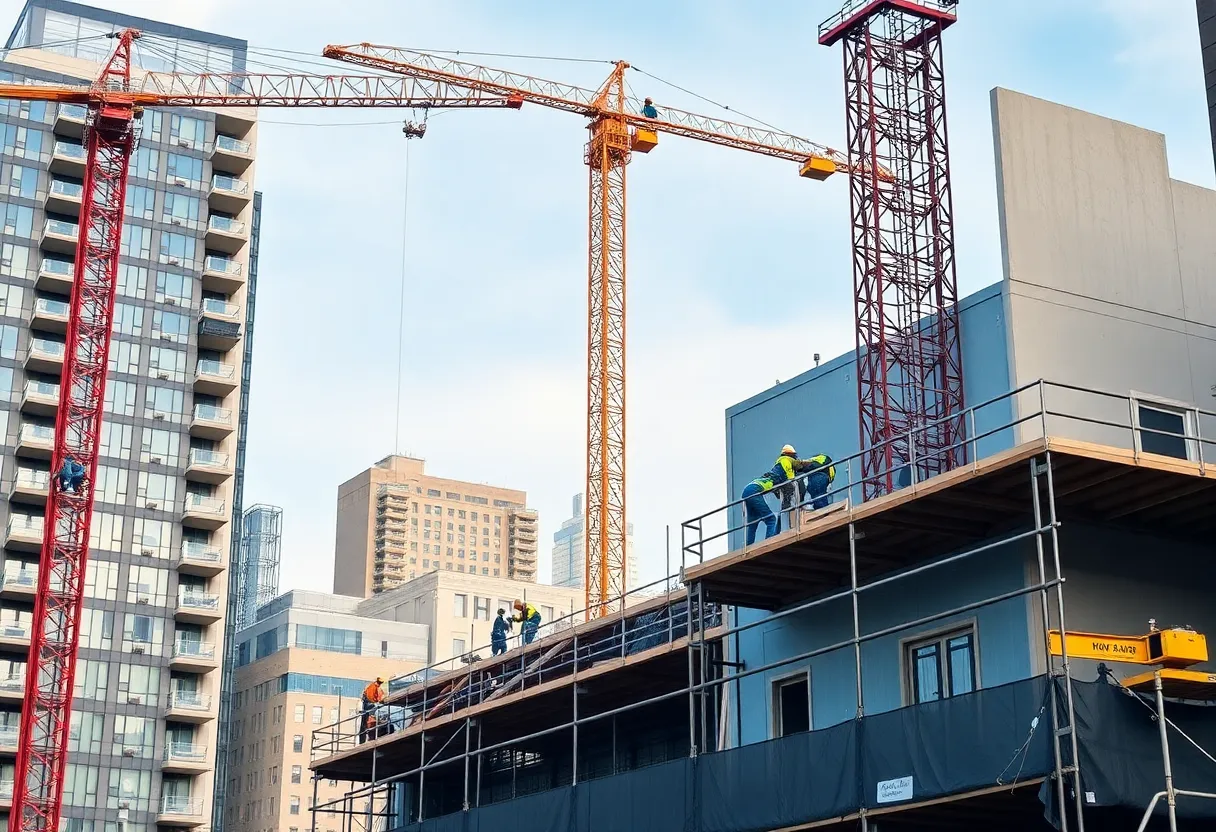New York City, November 11, 2025
New York State’s All-Electric Buildings Act will mandate that most new buildings up to seven stories be constructed without fossil fuel systems by 2026. This law aims to drive innovation and economic growth while reducing greenhouse gas emissions. Developers and building owners must adapt their practices to comply with the upcoming regulations, which require electric heating and appliances in new constructions.
New York’s All-Electric Buildings Act: What Developers and Owners Need to Know for 2026
New York City – Starting January 1, 2026, New York State will require most new buildings up to seven stories tall to be constructed without fossil fuel systems, marking a significant shift toward sustainable construction practices.
This upcoming law presents an important opportunity for economic growth and innovation as developers adapt to emerging green technologies. The All-Electric Buildings Act underscores the importance of resilience and forward-thinking in our business community, allowing local builders and entrepreneurs to lead the charge in environmentally responsible construction without unnecessary regulatory hurdles.
Key Provisions of the All-Electric Buildings Act
- Implementation Timeline: The law mandates that new buildings up to seven stories must be all-electric by January 1, 2026. For taller buildings, the requirement extends to January 1, 2029.
- Scope of the Law: The act prohibits the installation of fossil fuel-burning equipment, such as natural gas and propane systems, in new constructions.
- Exemptions: Certain facilities, including hospitals, commercial kitchens, laboratories, laundromats, car washes, crematoria, and manufacturing plants, are exempt from these requirements.
Implications for Developers and Building Owners
As the deadline approaches, developers and building owners should prepare for this transition by designing and constructing buildings with electric heating and appliances from the outset. This proactive approach not only ensures compliance with the new regulations but also offers long-term energy efficiency benefits, resulting in reduced operational costs over time.
Background Context
The All-Electric Buildings Act is a key component of New York’s broader strategy to combat climate change by reducing greenhouse gas emissions from the building sector, which accounts for approximately 32% of the state’s emissions. The implementation of this law will require innovative thinking and adaptation from the real estate sector, driving entrepreneurship and creating markets for new energy-efficient technologies.
Frequently Asked Questions (FAQ)
What is the All-Electric Buildings Act?
The All-Electric Buildings Act is a New York State law requiring most new buildings up to seven stories tall to be constructed without fossil fuel systems, effective January 1, 2026.
Which buildings are exempt from the All-Electric Buildings Act?
Exemptions include hospitals, commercial kitchens, laboratories, laundromats, car washes, crematoria, and manufacturing plants.
What are the deadlines for compliance with the All-Electric Buildings Act?
New buildings up to seven stories must comply by January 1, 2026. Taller buildings are required to comply by January 1, 2029.
How can developers and building owners prepare for the All-Electric Buildings Act?
Developers and building owners should design and construct buildings with electric heating and appliances from the outset to comply with the new regulations and benefit from long-term energy efficiency.
Why is New York implementing the All-Electric Buildings Act?
The act aims to reduce greenhouse gas emissions from the building sector, which accounts for approximately 32% of New York’s emissions, as part of New York’s broader strategy to combat climate change.
Key Features of the All-Electric Buildings Act
| Feature | Description |
|---|---|
| Implementation Timeline | New buildings up to seven stories must be all-electric by January 1, 2026; taller buildings by January 1, 2029. |
| Scope of the Law | Prohibits installation of fossil fuel-burning equipment in new constructions. |
| Exemptions | Includes hospitals, commercial kitchens, laboratories, laundromats, car washes, crematoria, and manufacturing plants. |
| Implications for Developers and Owners | Encourages designing and constructing buildings with electric heating and appliances to comply with regulations and achieve energy efficiency. |
| Environmental Impact | Aims to reduce greenhouse gas emissions from the building sector, which accounts for approximately 32% of New York’s emissions. |
As New York City gears up for this critical shift in building practices, local entrepreneurs and developers are in a unique position to take advantage of the evolving market landscape. Supporting initiatives that prioritize energy efficiency and sustainability will not only foster a more resilient economy but also enhance the quality of life for residents and businesses alike. Each step towards cleaner construction is a step towards a sustainable future for New York.
Now Happening on X
- @TarterKrinsky (November 7, 2025): Discusses preparations for New York’s All-Electric Buildings Act starting January 1, 2026, outlining key considerations for developers and contractors. View on X
- @BuildingLaw (November 7, 2025): Shares guidance on preparing for New York’s Jan. 1 All-Electric Buildings Act, focusing on what developers and contractors need to know. View on X
- @EnergyLaw (November 7, 2025): Highlights the upcoming requirements under New York’s All-Electric Buildings Act effective January 1, 2026, and provides insights for developers and contractors. View on X
- @ZoningLaw (November 7, 2025): Covers essential preparations for the Jan. 1 All-Electric Buildings Act in New York, emphasizing implications for developers and contractors. View on X
- @Legal_Alerts (November 7, 2025): Outlines what developers and contractors need to know ahead of New York’s All-Electric Buildings Act taking effect on January 1, 2026. View on X
- @NYCBldgTrades (November 10, 2025): Notes a significant approval milestone for generating affordable energy, lowering utility bills, and providing economic stimulus through construction projects in New York. View on X
- @airwinger_9014 (November 7, 2025): Comments on Governor Kathy Hochul’s support for banning fossil fuel hookups in new buildings under seven stories starting in 2026, as part of the state’s budget deal. View on X
Deeper Dive: News & Info About This Topic
HERE Resources
New York City Remains the World’s Most Expensive Construction Market
JPMorgan Chase Launches New Global Headquarters in NYC
NFL Teams Prepare for Trade Deadline and Running Back Moves
JPMorgan Chase Opens New Headquarters in New York City
JPMorgan Chase Inaugurates $3 Billion Headquarters in NYC
JPMorgan Chase Unveils New Headquarters in New York City
New York’s All-Electric Building Law Faces Builder Backlash
New York State Approves All Electric Buildings Act Mandating Electrification
New York’s Energy Policy Takes Center Stage in Legislative Session
Students Explore Careers in Construction Trades at Showcase
Author: STAFF HERE NEW YORK WRITER
The NEW YORK STAFF WRITER represents the experienced team at HERENewYork.com, your go-to source for actionable local news and information in New York, the five boroughs, and beyond. Specializing in "news you can use," we cover essential topics like product reviews for personal and business needs, local business directories, politics, real estate trends, neighborhood insights, and state news affecting the area—with deep expertise drawn from years of dedicated reporting and strong community input, including local press releases and business updates. We deliver top reporting on high-value events such as New York Fashion Week, Macy's Thanksgiving Day Parade, and Tribeca Film Festival. Our coverage extends to key organizations like the Greater New York Chamber of Commerce and United Way of New York, plus leading businesses in finance and media that power the local economy such as JPMorgan Chase, Goldman Sachs, and Bloomberg. As part of the broader HERE network, including HEREBuffalo.com, we provide comprehensive, credible insights into New York's dynamic landscape.





